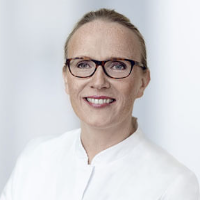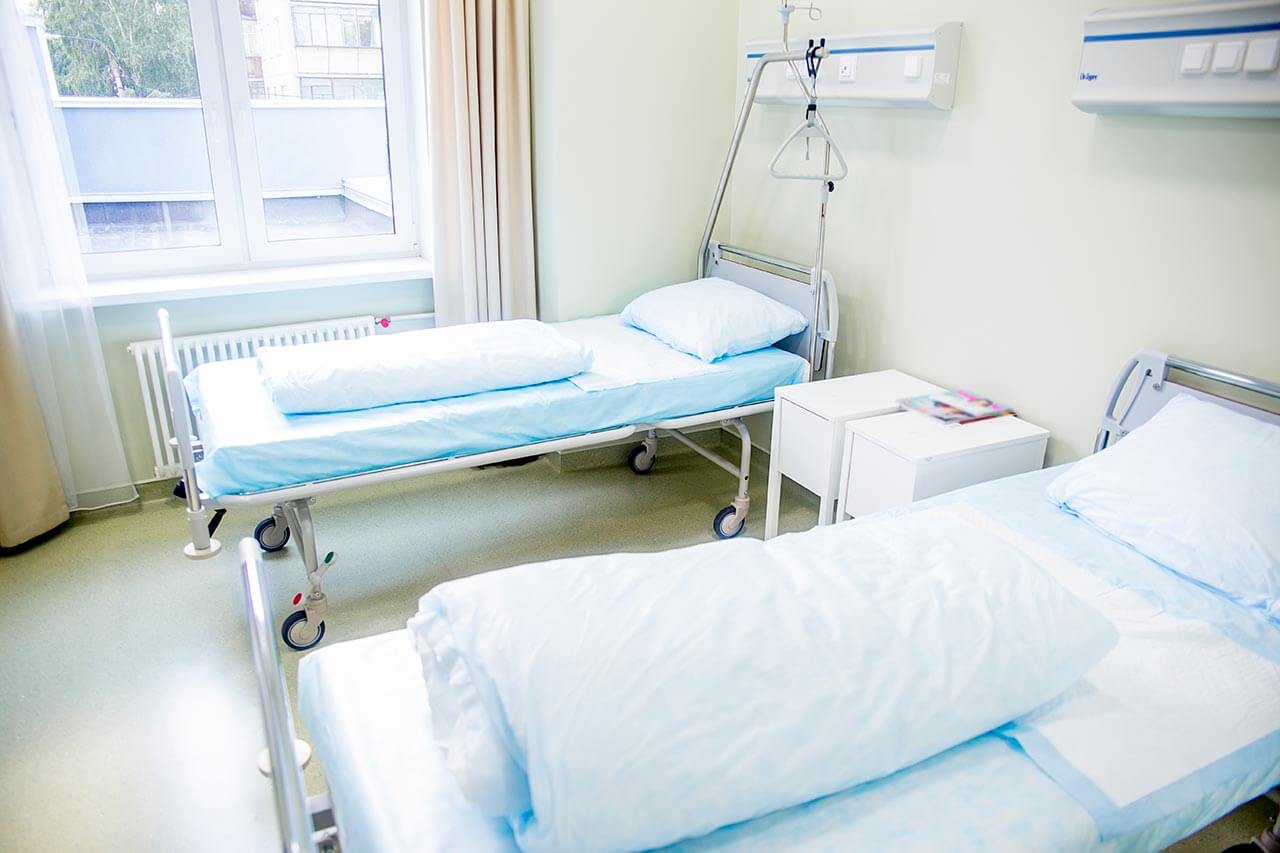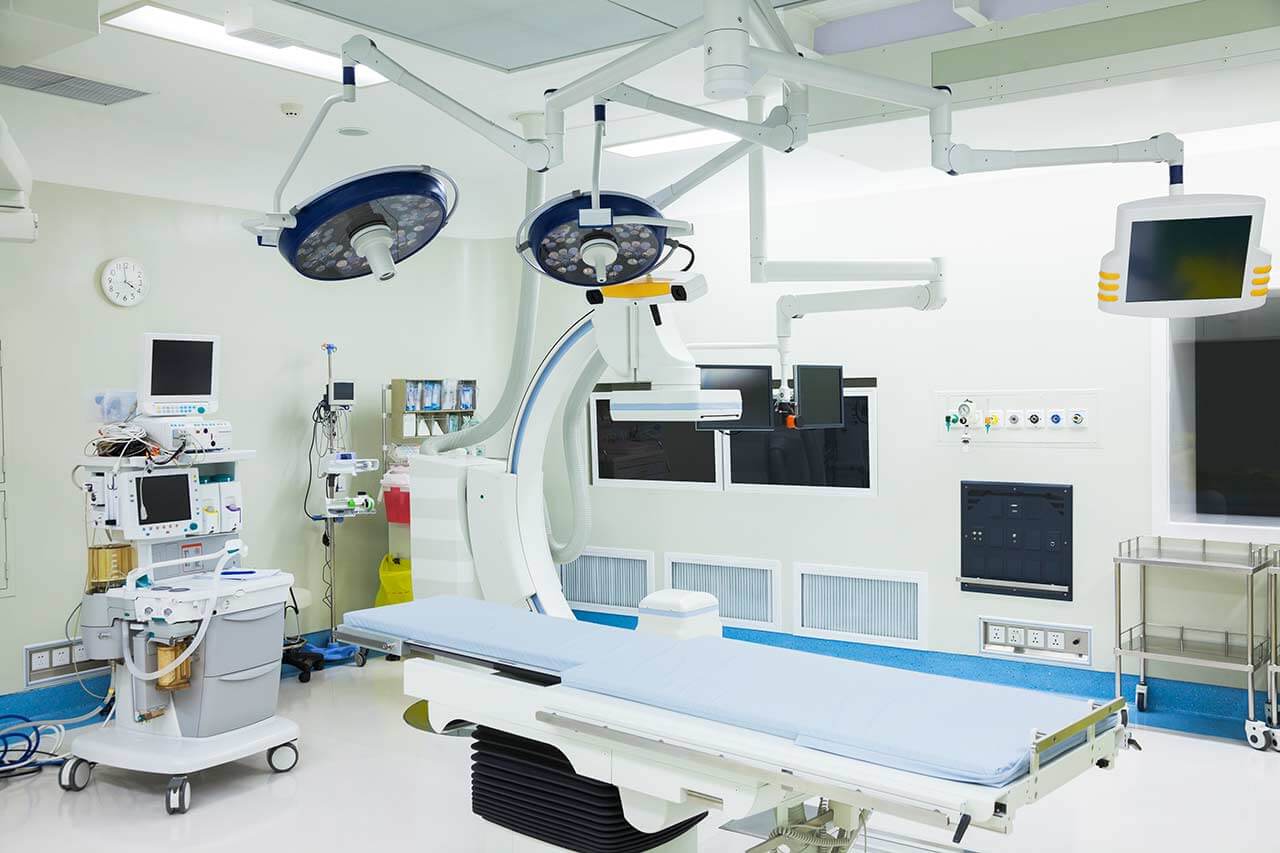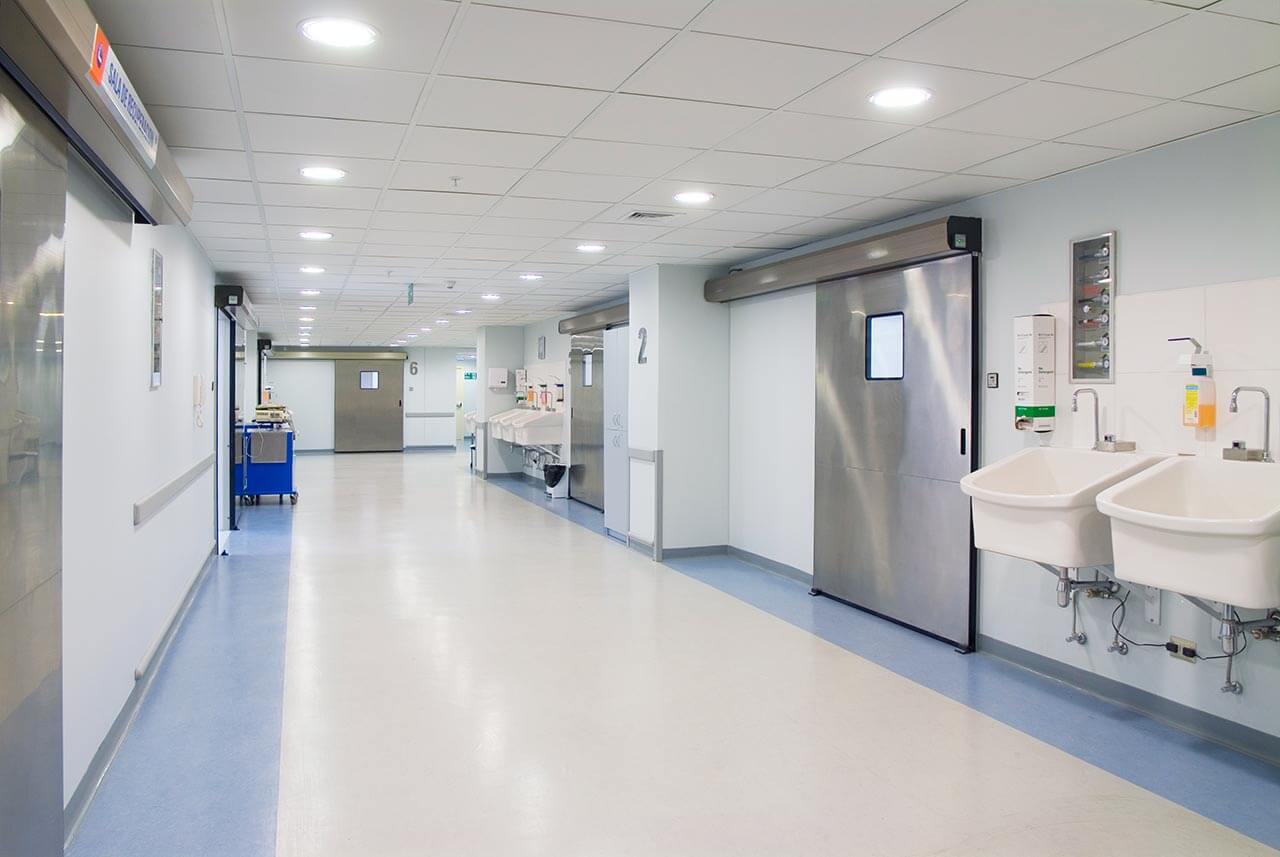
The program includes:
- Initial presentation in the clinic
- clinical history taking
- review of medical records
- physical examination
- ultrasound of the skin
- microscopic examination of the skin
- punch, excisional or incisional biopsy of the tumor (if clinically indicated, additional cost is 800 €)
- histological and immunohistochemical study (if clinically indicated, additional cost is 1200 €)
- nursing services
- consultation of related specialists
- treatment by chief physician and all leading experts
- explanation of individual treatment plan
Required documents
- Medical records
- Photo of the affected body regions
- Biopsy results (if available)
Service
You may also book:
 BookingHealth Price from:
BookingHealth Price from:
About the department
The Department of Dermatology and Allergology at the University Hospital Oldenburg offers a full range of medical services for the prevention, diagnosis, and treatment of skin diseases and allergic reactions on the skin. The medical facility was founded in 1996 and over the years of successful clinical practice has managed to gain high authority among dermatology centers in Germany. The department provides medical care for patients with eczema, psoriasis, dermatitis, acne, herpes, rosacea, vitiligo, skin cancer, venereal diseases, and other skin pathologies. An integral part of the work of the department's doctors is also the treatment of allergic reactions on the skin. Of particular clinical interest to specialists is the treatment of skin cancer: squamous cell carcinoma, basal cell carcinoma, and melanoma. Oncological skin diseases are treated in a specialized center that is part of the department. The department is certified in accordance with the standards of the German Cancer Society (DKG), which indicates outstanding success in the field of skin cancer treatment. The department has 33 inpatient and 15 semi-inpatient beds. Outpatient treatment is also available when clinically indicated. The Head Physician of the department is Prof. Dr. med. Ulrike Raap.
The main focus of the daily work of the dermatologists of the department is the diagnosis and treatment of tumors of the skin and its appendages. The department performs many modern diagnostic procedures to detect skin tumors, such as microscopy with a magnifying glass or high-resolution ultrasound to examine the skin and lymph nodes. For the treatment of oncological skin diseases, radical tumor removal surgery is performed followed by a histological examination, while precancerous diseases can be treated with cryotherapy, laser technologies, and/or photodynamic therapy. Patients with an increased risk of cancer recurrence are usually prescribed immunomodulatory drugs. Advanced stages of skin cancer are treated in cooperation with specialists from the Department of Oncology and Hematology: patients receive chemotherapy or targeted therapy. The department also has expertise in the treatment of cutaneous lymphomas. Phototherapy and photochemotherapy are successfully used in the course of the therapeutic process; the department also offers photopheresis, which is indicated in complex clinical cases.
The department also regularly treats patients with benign skin diseases, the most common of which are psoriasis, eczema, atopic dermatitis, and vitiligo. One of the highly effective methods of combating the above-mentioned pathologies is phototherapy, for which the department has the necessary equipment and qualified specialists. Phototherapy is a type of hardware dermatological treatment, the principle of which is to expose the affected area of the skin to light of a certain wavelength. The parameters of light irradiation, the duration of the therapeutic procedure, and the number of sessions are determined individually by the attending dermatologist. The advantages of phototherapy, in addition to its high efficiency, are good tolerability, no side effects, and painlessness. The department performs the following types of phototherapy: UV-B, UV-A, UV-A1, balneophototherapy, photochemotherapy (PUVA), and extracorporeal photopheresis.
The department also specializes in the treatment of chronic wounds, venous diseases, and hyperhidrosis (excessive sweating). Treatment options for these problems include both conservative and surgical procedures.
It is worth noting that the department's doctors care about the psychological health of the patients. Stressful situations can negatively affect the course of the disease and treatment, leading to a significant decrease in the quality of life. In addition, serious and chronic diseases, such as cancer, can lead to drastic changes in the lives of patients, so the department employs specially trained psychologists who help patients and their families reduce emotional stress.
In the field of allergology, the department deals with the diagnosis and treatment of all forms of allergic manifestations on the skin. A great advantage of the department is its own allergology and immunology laboratory, which performs a full range of skin and mucosal tests, as well as provocation tests with various allergens. The most common method of treatment is allergen-specific immunotherapy or drug therapy with oral medications, ointments, and gels.
The department diagnoses and treats the following dermatological diseases:
- Genetic skin diseases
- Infectious skin diseases caused by viruses, bacteria, fungi, and parasites
- Skin diseases caused by physical factors and chemicals
- Chronic inflammatory skin diseases
- Allergic skin lesions
- Autoimmune skin diseases
- Occupational dermatoses
- Skin manifestations of systemic connective tissue diseases
- Diseases of skin appendages
- Benign and malignant skin tumors
- Skin pigmentation disorders
- Pathological skin changes caused by vascular diseases
- Other dermatological diseases
The department's therapeutic options include the following:
- Dermatology
- Superficial skin cleansing in cases of skin lesions (for example, curettage)
- Electrosurgery and freezing with liquid nitrogen
- Dermabrasion
- Laser therapy
- Surgical resection of benign and malignant tumors
- Surgical scar revision
- Reconstructive plastic surgery with skin flaps
- Skin transplantation (free skin grafts)
- Phototherapy: UV-B, UV-A, UV-A1, balneophototherapy, photochemotherapy (PUVA), and extracorporeal photopheresis
- Drug therapy
- Allergology
- Allergen-specific immunotherapy
- Drug therapy
- Other treatment methods
Curriculum vitae
Prof. Dr. med. Ulrike Raap studied medicine at the University of Luebeck and the Hannover Medical School, where she defended her doctoral thesis in 1999 on the following subject: "Research of the programmed cell death of peripheral eosinophilic granulocytes in vitro". She then received her doctorate. After completing her doctorate at the University of Marburg in 2001, she returned to the Hannover Medical School. In 2009, she received her professorship (W1) and took up the position of Senior Physician. In 2013, Prof. Raap completed her doctorate on the following subject: "Mechanisms of neuroimmune interactions in allergic inflammatory reactions". Dr. Ulrike Raap has received numerous awards, including the Rudolf Schoen Award of the TUI Foundation and the Award for the Development of New Educational Methods (MEDIA) of the Federal Association for Information Technology, Telecommunications and New Media. Prof. Raap is a member of many professional societies, groups, and organizations. For example, she has been a Member of the Advisory Board of the German Society for Allergology and Clinical Immunology (DGAKI) since 2010.
Photo of the doctor: (c) Klinikum Oldenburg AöR
About hospital
The University Hospital Oldenburg is a multidisciplinary medical complex offering top-notch services of the European standard. The hospital has 20 specialized departments, 15 highly specialized centers, and more than 10 institutes. The hospital provides services in almost all areas of modern medicine: general and abdominal surgery, cardiac surgery, orthopedics, traumatology, cardiology, oncology, dermatology, gastroenterology, gynecology, mammology, urology, and pediatric and adolescent medicine.
The hospital has 832 beds, and many diagnostic and therapeutic procedures are performed on an outpatient basis. More than 150,000 patients are treated here annually, 37,000 of them receive medical care in a hospital setting. The medical complex has a highly professional medical team of more than 2,900 employees and most departments are headed by professors with extensive clinical experience.
The hospital is home to one of the best comprehensive cancer centers in Germany (Nordwestdeutsches Tumorzentrum), certified according to the requirements of the German Cancer Society (DKG). The center successfully treats breast cancer, prostate cancer, colorectal cancer, pancreatic cancer, esophageal cancer, head and neck tumors, skin tumors, and other oncological diseases. The center uses modern cancer treatment methods with proven effectiveness and also offers allogeneic and autologous bone marrow transplantation for the treatment of severe hematologic diseases (European certification JACIE).
The University Hospital Oldenburg is an expert medical facility in robotic surgery. The hospital has a specialized da Vinci Surgery Center, where gastrointestinal, urological, and gynecological diseases are treated with excellence. Patients are operated on by highly qualified professors with in-depth expertise and extensive experience in robotic surgery.
The University Hospital Oldenburg is one of the leading medical institutions in Germany because it offers excellent medical and technical resources, qualified personnel, and a comfortable infrastructure designed with the needs of patients in mind. The hospital's physicians treat patients with complex clinical cases and achieve incredible results.
The basis of medical care in the hospital is humane attitude to the patient, empathy and understanding of his needs. During the therapeutic process, the patient is surrounded by care and, if necessary, receives professional psychological support.
Photo: (с) depositphotos
Accommodation in hospital
Patients rooms
The patients at the University Hospital Oldenburg stay in comfortable single, double, and triple rooms. Each patient room has an ensuite bathroom with a toilet and a shower. The patient rooms have a TV, a telephone, and Wi-Fi. The patient rooms in the pediatric departments are designed in an appropriate interior to make the young patients feel as comfortable as possible. A child can stay in the same room with one of the parents.
The hospital has an excellent infrastructure: there is a pharmacy, a hairdresser, an ATM, and a library with audio books, DVD movies, and board games.
Meals and Menus
The hospital offers delicious and balanced meals three times a day: breakfast, lunch, and dinner. Since 2022, a new menu "Vitalessen" has been introduced here, which excludes the addition of preservatives, dyes, and flavor enhancers to food. The menu takes into account all preferences and wishes of the patients.
There is also a cozy cafe in the hospital, where you can enjoy a tasty snack or a cup of aromatic coffee or hot tea with dessert.
Further details
Standard rooms include:
![]() Toilet
Toilet
![]() Shower
Shower
![]() Wi-Fi
Wi-Fi
![]() TV
TV
Religion
There is a chapel on the ground floor of the hospital where Catholic and Evangelical services are held regularly. Services by representatives of other religions are available upon request.
Accompanying person
Your accompanying person may stay with you in your patient room or at the hotel of your choice during the inpatient program.
Hotel
You may stay at the hotel of your choice during the outpatient program. Our managers will support you for selecting the best option.




